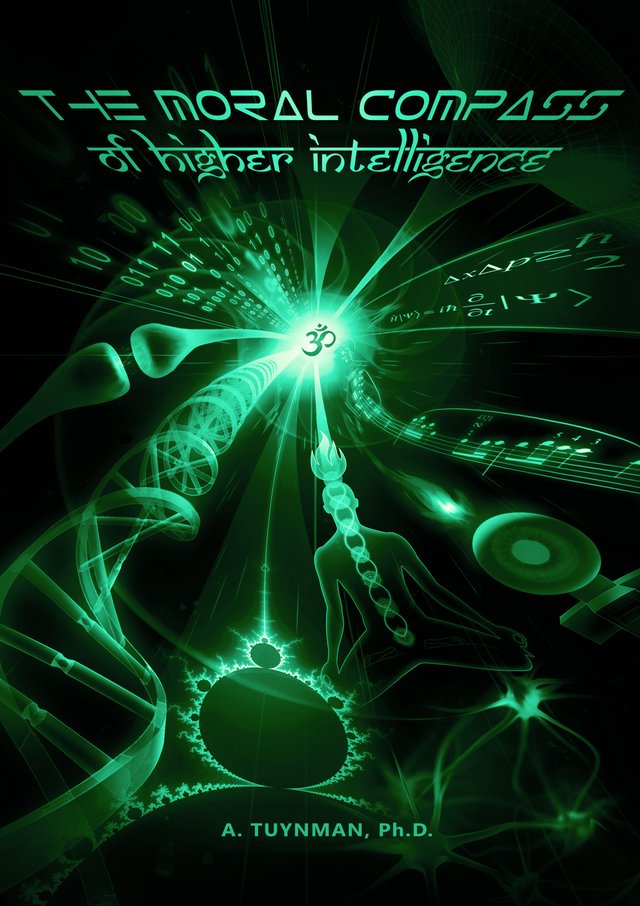Morality of the Intelligence Algorithm
In this article I will discuss the moral (or immoral) considerations which are implicit in the steps of nature's "Intelligence Algorithm?"
Background
In my book "Is Intelligence an Algorithm?" I describe how in Nature we see how living and non-living systems evolve by differentiation and diversification, competition, engaging in mutual relationships and forming new aggregated and integrated entities at a higher aggregation level. For instance certain prokaryotes and proto-eukaryotes evolved by differentiation and diversification to a stage where they could engage in a symbiotic relationship giving rise to real Eukaryotes that harbour these prokaryotes as energy factories, better known as mitochondria. The creation of such a new aggregation level was called a meta-system transition. In Nature in order to be teleologically constructive, it is sometimes necessary to sacrifice lower levels entities in their free form to integrate them into a new more complex form. Nature ultimately seems to strive for a unification and integration of its parts, but to be able to do so, it must create a plethora of (life)forms to be able to screen and prune which ones are capable of meaningfully interacting, so as to give rise to new stable (life)forms, which harbour more complexity. Nature can thus be considered as a complexity generator. Why? Because it gives Nature an advantage for survival. More versatile systems have a greater chance of surviving and adapting once resources become scarce.
Although morality is a concept which we usually only attribute to agreed group behaviour of human beings, a behaviour that aims to preserve the stability and cohesion of the group by imposing rules and regulations, common habits and traditions to discriminate between friend and foe, it is perhaps in a broader sense also a notion which we can stretch to describe certain behaviour observed in Nature.
Inherent Morality in Nature?
In a certain sense morality ultimately aims to warrant the survival of the group in question. This ultimate purpose makes that a very general description of morality could be considered as that which is teleologically constructive for the group. Nature as a whole however also appears to aim to be teleologically constructive overall, but its internal dynamics, will lead to the probing for solutions, which may sometimes involve the necessity to get rid of a certain (life)form, which turns out to be teleologically destructive for Nature as a whole. Such species then disappear from the scene. This may have been what happened to the dinosaurs and can be what will happen to humanity, as we are becoming a particular dangerous viral disease that may compromise the survival of life on Earth. From the point of view of the species (the dinosaurs or humans) their all-usurping attitude may seem to be morally justified: They strive for the perpetuation of their own species. But such experiments can go haywire: If bacteria on a Petri dish exhaust the food resources, they massively die out. It may happen to us. Therefore not all evolutionary experiments of Nature are ultimately teleologically constructive. From a point of view of Nature as a whole, such experiments are teleologically destructive and could hence be called "immoral".
In their efforts to survive and evolve lifeforms in Nature face at least three limiting conditions: Energy (resources available for the survival for the species), Necessity (other factors from the environment that impose a stress to which the species needs to respond by changing its behaviour) and Morality (whether a choice is aimed at a teleological constructive or destructive behaviour). These conditions determine the ability of the species to be motivated to change or maintain behaviour.
Intelligence algorithm
In the intelligence algorithm, a species always starts from a status quo. Here the role of the so-called conformity enforcers (in Ben-Jacob's classification) within a group is crucial in order to maintain the status quo as long as possible. It means that what is considered to be teleological constructive or moral is the perpetuation of the habits in place.
....
Read more of this article in my upcoming book: "The moral compass of higher Intelligence".
Liked what you just read? Please upvote and/or resteem!
More of this in my upcoming book "The Moral compass of Higher Intelligence"
You can find my books on Amazon in paperback or ebook format (in India only 50Rs.)
Technovedanta (https://www.amazon.com/gp/aw/d/B07D92DZYZ),
Transcendental Metaphysicshttps://www.amazon.com/gp/aw/d/B07D912ZW7)
Is Intelligence an Algorithm?(https://www.amazon.com/gp/aw/d/1785356704)
Is Reality a Simulation? An Anthology (https://www.amazon.com/gp/aw/d/B07D7JX4RS)
